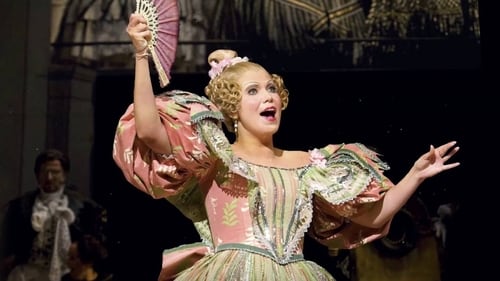
Dr. Caius

Spalanzani
The great storyteller Hoffmann is losing himself to drink. His rival in love, Councillor Lindorf, claims that Hoffmann knows nothing of the heart, and so goads Hoffmann into telling the tales of his three great loves – each destroyed by a villain who bears an uncanny resemblance to Lindorf… First Hoffmann tells of his infatuation for the mechanical doll, Olympia – who is destroyed by the inventor Coppélius. Next comes the courtesan Giulietta, who throws over his adoration in favour of jewels from the magician Dappertutto. Finally, the gentle Antonia is forced to sing to her death by the wicked Doctor Miracle. His stories finished, Hoffmann rouses from his drunken stupor to find Lindorf has made off with Stella, Hoffmann’s latest love – but the Muse compels him to transform his heartache into art.

Andrès/Cochenille/Frantz/Pittichinaccio
Bregenzs Tales of Hoffmann is different from everything you saw before. The New York Times praised the thoughtfulness and creativity of Stefan Herheims new production, devised by the director as a search for ones own self in a sparkling drag show. A shining-toned (NYT) Hoffmann is embodied by tenor Daniel Johansson in the title role. He is supported by a fantastic cast: Rachel Frenkel is positively ideal as Muse and Niklausse (Kurier), Kerstin Avemo as Olympia is endowed with brilliant, cheekily extemporized coloraturas (Neue Zürcher Zeitung), Michael Volle sings the parts of Lindorf, Coppelius, Dr. Miracle and Dappertutto, the works four villains, with warmth and intensity (NYT) and Mandy Fredrich is a finelyphrased Antonia (Kurier).

Guillot de Morfontaine
Star soprano Anna Netrebko scored a triumph in Laurent Pelly’s acclaimed 2012 production, singing the title heroine for the first time at the Met. Manon’s story—from innocent country girl to celebrated courtesan to destitute prisoner—is one of the great tragic tales in literature and music, and this performance brings out all of its colors, as seen through Massenet’s masterful score, from the comedic beginning to the heart-wrenching finale. Piotr Bezcala is des Grieux, Manon’s lover, who decides to become a priest when she leaves him, but ultimately is reunited with her, only to lose her again. Paulo Szot sings Lescaut, and Fabio Luisi conducts the Met Orchestra and Chorus.

Prosper
Live performance from Opéra National de Lyon.

Le roi carotte


